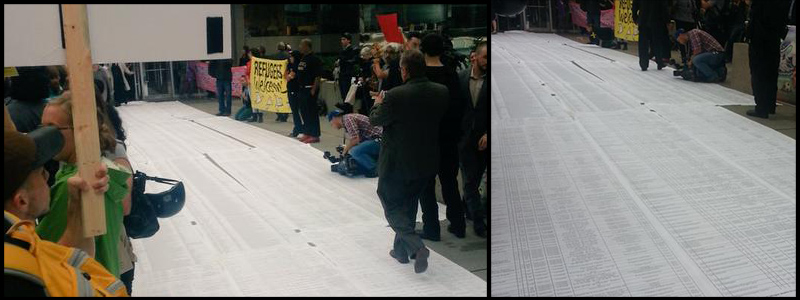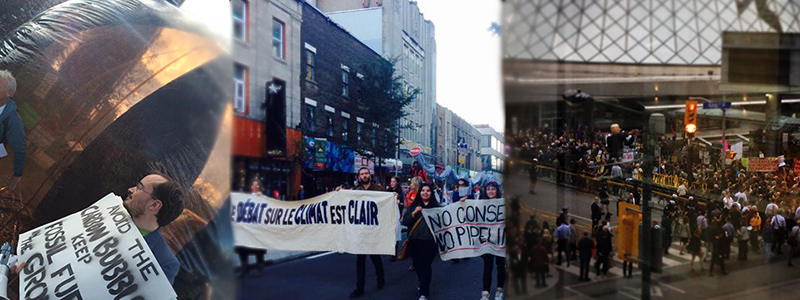Last night, the audience for the Munk Debate on Foreign Policy was met with a surprise. As ticket holders gathered at the entrance of Roy Thompson Hall in the heart of downtown Toronto, they quickly realized they would have some trouble getting in. Preceding their arrival, migrant justice organizers had blocked the front doors of the building by unfurling a list of 40,000 people that lost their lives to displacement. As others gathered in solidarity with these displaced individuals, families and communities, a barrier arose around the list, forcing those trying to enter the hall to walk around the list.

The few seconds delay confused the attendees — many of them were disgruntled, some curiously accepted ‘Refugees Welcome’ pamphlets to try and understand the action a little bit more, and others ignored the demonstration completely, choosing to walk on top of the names of the deceased individuals in an act of entitled defiance.
Of course this re-route is nothing compared the massive displacement taking place across the planet as a result of a global climate crisis.. For the 26 million people that have lost their homes to extreme climate events, displacement has irreversibly and catastrophically altered the course of their lives. Yet their voices, along with the voices of the millions of refugees and Indigenous peoples across the world that struggle with the unjust legacies of colonialism and imperialism, have no place in debates about foreign policy.
The action last night boldly connected the dots between Canada’s foreign policy, the refugee crisis and climate justice. Unfortunately, the leaders completely fell short of doing that.
Justin Trudeau acknowledged that the Syrian refugee crisis has been exacerbated by climate change. He criticized Harper’s climate inaction but did not making any sort of a commitment to tackle the global crisis. Thomas Mulcair called out Harper and Trudeau for their failure on the Keystone Pipeline, arguing that the pipeline would export jobs to the United States instead of benefiting Canadians. However, he was silent on Energy East and the other transportation routes contributing to the expansion of the tar sands and would, in turn, condemn the climate to a catastrophic 2 degree rise.
Each of the candidates attempted to convince the audience that they would make the best representative for Canada at the international climate negotiations. The frustrating part is that none of the candidates have a plan that’s actually in line with the science of climate change.
More than that, none of the candidates made any attempt to address or even acknowledge the injustices that a large group of people was calling out right outside the debate. This is the third time in this election that the three party leaders were met with a large mobilization right outside of an electoral debate. First, they were greeted with a carbon bubble at the Calgary debate on the economy. Then, last week, hundreds of people took to the streets of Montreal outside of the French debate in a convergence demanding justice on a range of issues, including climate. Nevertheless, time and time again, the leaders took to the podiums only to regurgitate the same talking points again and again — instead of actually tailoring their positions to reflect context or public opinion.

From left to right, the actions at the debates in Calgary, Montreal and Toronto (Photo Credit: salimarawji – instagram)
Don’t get me wrong. People power has has an impact. Four years ago, there’s not a chance that climate change and refugee justice would have been so central to a debate on foreign policy, but it is evident that strong people’s movements changed that. Mobilizations across Canada have brought these issues to the election. It’s just that we’re still waiting to move beyond the empty rhetoric.
All the rallying, marching and demonstrating we’ve done over the last decade has had an influence. Politicians know that they can no longer ignore issues that they’ve been trying to sweep under the rug. However, the immediacy of the climate crisis means that we need to escalate our mobilizations. We need to create a plan to send a bold message to Canada’s next government, reminding them that people won’t just settle down on the backseat after the election. We are planning to hold the government accountable in its first weeks in office — and very soon, we’ll be calling on you for help.